By Shantanu Kaushik
Cloud storage is one of the most essential modules of the complete cloud computing resource. A dynamic and scalable storage solution can make all the difference when deploying applications with high read/write functionality or an extended user-base.
The Alibaba Cloud Object Storage Service (OSS) was designed to embrace the challenges faced by developers and administrators and turn them into benefits. The well-defined benefits and features make OSS a one-stop storage product for the cloud.
The Alibaba Cloud OSS delivers and protects the user data to provide a highly-available resource for static websites, mobile applications, or a DevOps solution. In this article, we will discuss the benefits and features of the Object Storage Service, along with its usage scenarios. We will showcase different models that are applied for different use-cases and how well they are formulated to tackle challenges.
Security is a pivot point for any product that handles massive amounts of data and information. It is imperative that the security practices associated with the Object Storage Service meet the industry standards.
The Alibaba Cloud Object Storage Service (OSS) offers multi-level security protection. Enterprises can leverage features, such as server-side and client-side encryption, hotlink protection, permission control, IP blacklist/whitelist, and WORM (write once read many) policies. With the Object Storage Service, you can easily isolate resources for multiple tenants and enable zone-disaster recovery.
The Alibaba Cloud Object Storage Service (OSS) is based on a multi-redundancy architecture with high-tolerance to faults. It is the backbone of data storage needs for every product within the Alibaba Cloud lineup. OSS has been known to eliminate single point of failures (SPOFs) to ensure a highly-reliable and available data storage solution.
Storage solutions need to be intelligent. A storage solution is the prime mover for any product and takes care of delivery and data storage needs. The Object Storage Service (OSS) facilitates multiple redundant copies of data for backup purposes and to maintain high-availability scenarios. It also provides image processing, video snapshot, SQL in-place query. OSS is known for its seamless integration with the Hadoop ecosystem and other Alibaba Cloud services, such as MaxCompute, E-MapReduce, Function Compute, Database Systems, and Data Lake Analytics.
The Alibaba Cloud Object Storage Service (OSS) helps users extract more value from their data. With simplified data processing and availability of products to cater to different types of processing needs, the Alibaba Cloud OSS is one of the most feature-rich products available. Apsara Video for Media Processing (MTS), MaxCompute, Image Processing Service (IMG), and BatchCompute are known for providing multi-scale data processing power to the user.
The diagram below shows how this works:
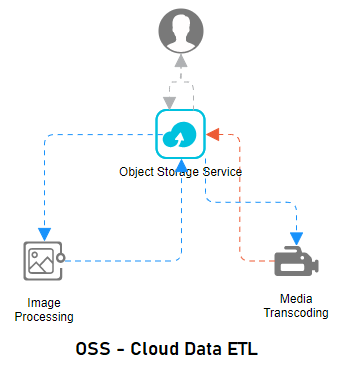
The Alibaba Cloud OSS provides one of the most advanced rich media processing services. With that, the array of formats and product connections within the Alibaba Cloud product cycle makes it a highly reliable and scalable solution.
The Object Storage Service (OSS) lets you manage the content of your website isolating different content types. The static objects, such as scripts, videos, and images, are actively separated from the dynamic content. The Content Delivery Network (CDN) creates cache copies of the static data and stores the data at the edge nodes in multiple regions for higher availability. This can also be achieved using the Border Gateway Protocol (BGP).
The diagram below shows how this works:
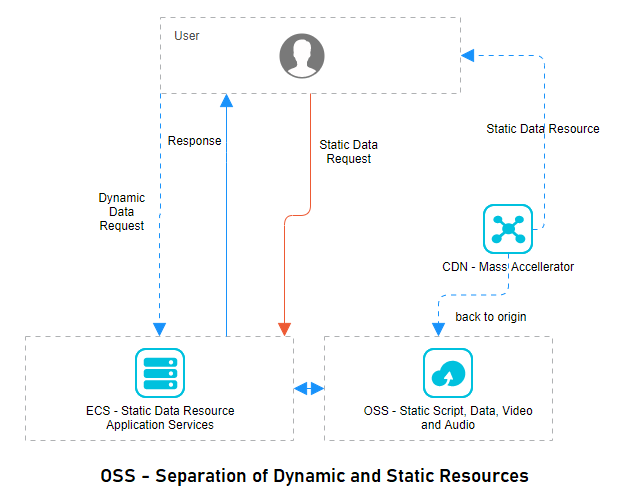
The Object Storage Service (OSS) allows for large amounts of data to be downloaded with concurrent requests by optimizing and providing high bandwidth operations. This is achieved using Transfer Acceleration.
Quick Info: The Alibaba Cloud Object Storage Service improves the data transfer (upload and download) speeds using Transfer Acceleration. It is an end-to-end transfer solution that incorporates protocol stack tuning, optimal route selection, smart scheduling of operations, and optimized transfer algorithms with server-side configurations of OSS.
The distributed data-centers are used for this acceleration mechanism. Every time a transfer request is received, the transfer mechanism decides on an optimal path and configuration for enhanced speeds and user experience.
By separating the static website content with the dynamic content, the Alibaba Cloud OSS ensures an enhanced content delivery for websites and mobile applications. The data source could be the same, and in most cases, a single instance Elastic Compute Service (ECS) resource will handle both requests at the same time for data delivery. Both of these requests will be handled, and the content will be delivered based on the object call request. This ensures the elastic scaling of resources for a more cost-efficient solution.
We have already covered the tools and resources that are available for the Object Storage Service (OSS) to leverage. This further enables the OSS to store and provide mass data storage options for images, audio, and video files.
The Alibaba Cloud OSS also supports storage and delivery for other file types. The user can access (read and write) the OSS using any terminal, SDKs, APIs, web and mobile applications, without middleware. The OSS console packs a lot of access functionality, and the user applications can directly read and write data to the OSS. This ensures a secure, flexible, and cost-effective solution for handling mass storage.
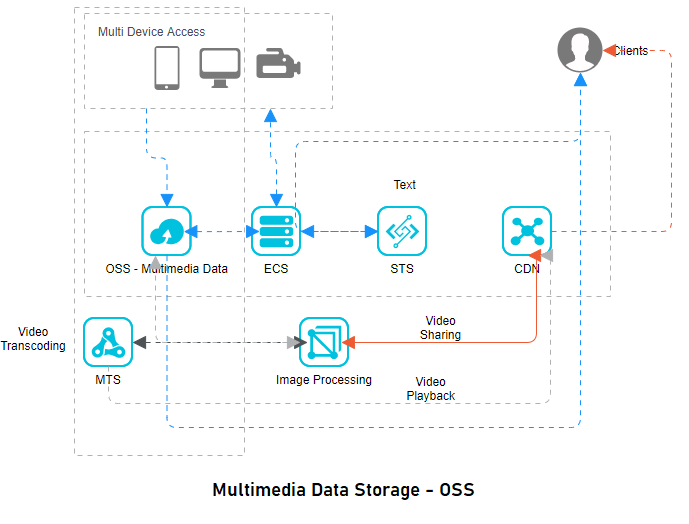
The Object Storage Service (OSS) supports multiple storage types. As a user, you can store all types of data. A well-defined storage algorithm stores data depending on the type of data/object that is being stored. This enables a high-performing storage solution to work with efficiency while delivering data.
Let's think of a scenario where the storage function is an archive type. This data may not be accessed for a while. In this case, the data will be stored with functionality that stores it with longer and more widespread access cycles.
Similarly, the data objects that require frequent access are stored for quicker delivery and access cycles. This ensures an in-sync data storage and retrieval solution based on the demand and data type. The diagram below shows how this works:
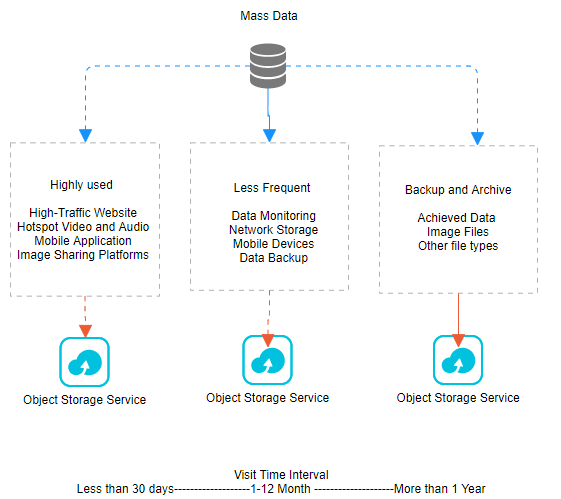
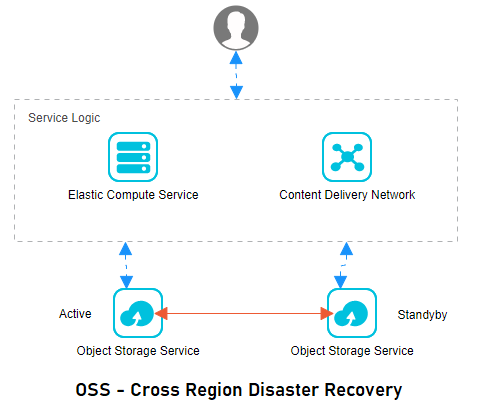
The Object Storage Service (OSS) works with redundancies and synchronizes data to any region in real-time if a disaster is detected. Multiple redundancies are in place for quickly and efficiently dealing with disasters and to ensure the maximum availability of data with the OSS.
The Elastic Compute Service (ECS) and the Content Delivery Network (CDN), work in-sync with keeping the OSS instances updated and ready to be replaced if a disaster occurs. As one server resource goes offline, the standby resource is automatically deployed to continued availability. The OSS secures important data to maximize service stability and business operation continuity.
The Object Storage Service (OSS) is a revolutionary product that combines storage with smart solutions to alter the way industry defines storage. The OSS has redefined the way storage works by selecting storage types depending on the variable access times for specified data. The combination of MTS, ECS, Function Compute, Max Compute, and CDN among other products by Alibaba Cloud has made the Object Storage Service a boon to the storage industry.
The redundancies in place account for any disaster recovery solutions. The Database Link and Transfer Acceleration alongside side MTS for media processing makes this the best-in-class service.
Alibaba News Roundup Highlights of 2020 11.11's First Shopping Window

2,593 posts | 793 followers
FollowAlibaba Clouder - November 10, 2020
Alibaba Clouder - April 22, 2021
Alibaba Clouder - November 27, 2020
Alibaba Clouder - July 16, 2018
Alibaba Clouder - January 4, 2021
Farah Abdou - January 23, 2026

2,593 posts | 793 followers
Follow Secure Content Delivery Solution
Secure Content Delivery Solution
Accelerate static and dynamic web content in a fast, reliable, and safe way using Secure DCDN (Dynamic Route for CDN)
Learn More Content Delivery Solution
Content Delivery Solution
Save egress traffic cost. Eliminate all complexity in managing storage cost.
Learn More Edge Security Acceleration (Original DCDN)
Edge Security Acceleration (Original DCDN)
Edge Security Acceleration (ESA) provides capabilities for edge acceleration, edge security, and edge computing. ESA adopts an easy-to-use interactive design and accelerates and protects websites, applications, and APIs to improve the performance and experience of access to web applications.
Learn More Apsara File Storage NAS
Apsara File Storage NAS
Simple, scalable, on-demand and reliable network attached storage for use with ECS instances, HPC and Container Service.
Learn MoreMore Posts by Alibaba Clouder